|
 Conocybe gracilenta Conocybe gracilenta
BiostatusPresent in region - Indigenous. Endemic
Images (click to enlarge)
Caption: Horak 68/303 (holotype), 0. Basidiomata; P. Caulocystidia; Q. Cheilocystidia; R. Basidiospores. | 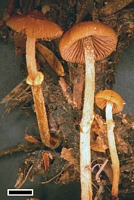
Caption: scale=2mm
Owner: J.A. Cooper | 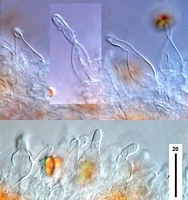
Caption: cheilocystidia
Owner: J.A. Cooper | 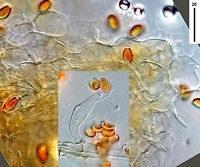
Caption: cap cells and inset caulocystidium
Owner: J.A. Cooper | 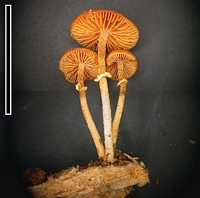
Caption: scale=2cm
Owner: J.A. Cooper | 
Caption: picture a bit too orange
Owner: J.A. Cooper | 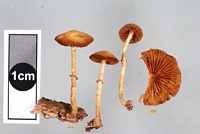
Owner: J.A. Cooper | 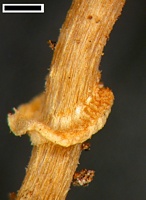
Caption: scale=0.5mm
Owner: J.A. Cooper | 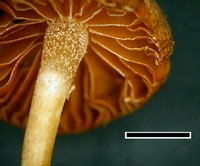
Caption: scale=2mm
Owner: J.A. Cooper | 
Caption: cheilocystidia and spores.
Owner: J.A. Cooper | 
Owner: J.A. Cooper |
Article: Watling, R.; Taylor, G.M. (1987). Observations on the Bolbitiaceae: 27. Preliminary account of the Bolbitiaceae of New Zealand. Bibliotheca Mycologica 117: 61 p. + 17 pl.
Description: Pileus 10.5-11 mm, hemispheric to convex, ochre brown, paler with age or when dry, strongly hygrophanous, submicaceous shiny, disc somewhat venose, dry; margin indistinctly striate. Stipe 33 x 1-1.5) mm, cylindric, sometimes with subbulbous base, annulate, concolorous with pileus, apex minutely pruinose, towards base fibrillose, dry, fragile; ring striate, subpersistent. Gills adnexed to adnate, ventricose, pale ochre brown, with concolorous or whitish, even edge. Taste and smell none.
Basidiospores 8.5-10 x 5-6 µm, elliptic in face-view, slightly flattened in side-view, thick-walled, non-amyloid, ochraceous brown in water and aqueous alkali solutions; germ-pore prominent and broad. Basidia 4-spored, clavate with short pedicel, hyaline in water and alkali solutions, 22-25 x 8-10 µm. Cheilocystidia lageniform with narrow venter 30-40 x 8-12 µm, neck 10-15 µm long, not distinct, tapered to apex 2.5-3 µm, some cells almost pointed; pleurocystidia absent. Pileipellis a strict palisadoderm of spheropedunculate cells with smooth or slightly encrusted pedicels, 18-24 µm broad. Stipitipellis of parallel, brown-walled hyphae, covered at apex with ventricose-rostrate caulocystidia, 20-35 x 4-7.5 µm. Clamp-connections present.
Notes: This comes close to both the European C. filaris (Fr.) Kuhner and South American C. austrofilaris (Singer) Watling; it differs from the latter in lacking the variable cheilocystidia and the encrusted amorphous pigment on the gill-margin found in that species. It differs also from the former particularly in its more slender and elegant nature and the narrower cheilocystidia. In stature it resembles C. flexipes Watling but this species has much larger basidiospores.
|